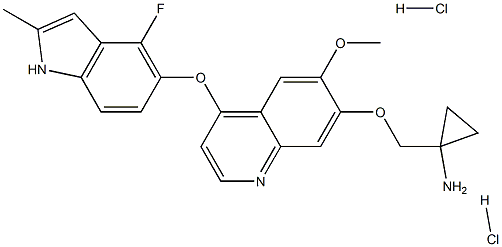Anlotinib
- CAS No.
- 1360460-82-7
- Chemical Name:
- Anlotinib
- Synonyms
- Anlotinib HC;Anlotinib HCl;Anlotinib 2HCl;AL3818 DIHYDROCHLORIDE;Anlotinib HCl ( AL-3818 );Anlotinib(AL3818)dihydrochloride;Anlotinib dihydrochloride. Catequentinib;1-(((4-((4-Fluoro-2-methyl-1H-indol-5-yl)oxy)-6-methoxyquinolin-7-yl)oxy)methyl)cyclopropanamine dihydrochloride;Cyclopropanamine, 1-[[[4-[(4-fluoro-2-methyl-1H-indol-5-yl)oxy]-6-methoxy-7-quinolinyl]oxy]methyl]-, hydrochloride (1:2)
- CBNumber:
- CB93159863
- Molecular Formula:
- C23H24Cl2FN3O3
- Molecular Weight:
- 480.3593632
- MDL Number:
- MOL File:
- 1360460-82-7.mol
| solubility | DMSO: 48 mg/mL (99.93 mM);Ethanol: Insoluble |
|---|---|
| form | Solid |
| color | Off-White to Pale Brown |
| Water Solubility | Water: 96 mg/mL (199.85 mM) |
| FDA UNII | A3749M6582 |
Anlotinib Chemical Properties,Uses,Production
Uses
Anlotinib Dihydrochloride, is a novel inhibitor of tyrosine kinase that is designed to primarily inhibit VEGFR2/3, FGFR1-4, PDGFRa/b, c-Kit, and Ret.
Biological Activity
Anlotinib Hydrochloride is a highly potent and selective inhibitor of VEGFR2 with IC50 of less than 1 nM. It has broad-spectrum antitumor potential in clinical trials. Please use normal saline for dilution, do not use PBS for dilution, which may cause precipitation.
in vitro
Anlotinib can occupy the ATP-binding domain of VEGFR tyrosine kinase, and has high selectivity and inhibitory activity for VEGFR2 compared to other tyrosine kinases (IC50<1 nM). Anlotinib inhibits VEGFR2 and VEGFR3 with IC50 of 0.2 nM and 0.7 nM, respectively. Anlotinib has low inhibitory activity against VEGFR1 with IC50 of 26.9 nM. Anlotinib inhibits PDGFR-related kinases c-Kit and PDGFRβ with IC50s of 14.8 and 115 nM, respectively. It has less activity against other kinases such as c-Met, c-Src, EGFR and HER2. Anlotinib inhibits VEGF-induced signaling and cell proliferation in HUVEC cells at picomolar concentrations. However, in vitro tumor cells require micromolar concentrations of anlotinib to directly inhibit their proliferation. Anlotinib significantly inhibited HUVEC migration and tubulogenesis, and also inhibited vascular growth in rat aortic grafts in vitro.
target
| Target | Value |
| VEGFR2 (Cell-free assay) | 0.2 nM |
| VEGFR3 (Cell-free assay) | 0.7 nM |
| 14.8 nM | |
| c-Kit (Cell-free assay) | 14.8 nM |
| c-Kit (Cell-free assay) | 14.8 nM |





